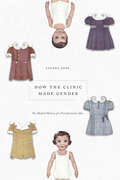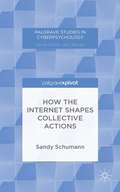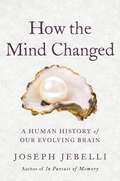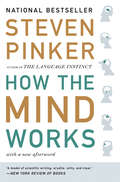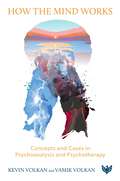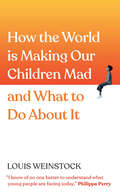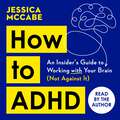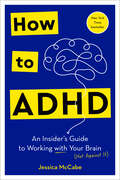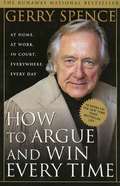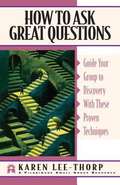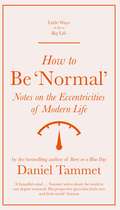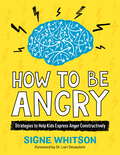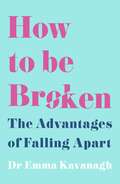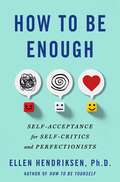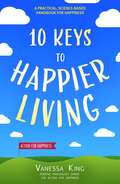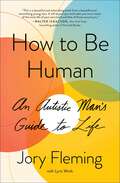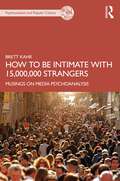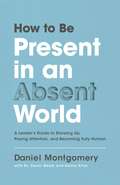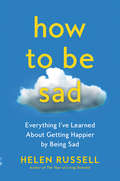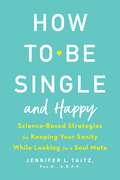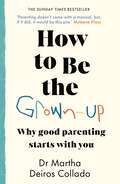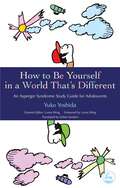- Table View
- List View
How the Clinic Made Gender: The Medical History of a Transformative Idea
by Sandra EderAn eye-opening exploration of the medical origins of gender in modern US history. Today, a world without “gender” is hard to imagine. Gender is at the center of contentious political and social debates, shapes policy decisions, and informs our everyday lives. Its formulation, however, is lesser known: Gender was first used in clinical practice. This book tells the story of the invention of gender in American medicine, detailing how it was shaped by mid-twentieth-century American notions of culture, personality, and social engineering. Sandra Eder shows how the concept of gender transformed from a pragmatic tool in the sex assignment of children with intersex traits in the 1950s to an essential category in clinics for transgender individuals in the 1960s. Following gender outside the clinic, she reconstructs the variable ways feminists integrated gender into their theories and practices in the 1970s. The process by which ideas about gender became medicalized, enforced, and popularized was messy, and the route by which gender came to be understood and applied through the treatment of patients with intersex traits was fraught and contested. In historicizing the emergence of the sex/gender binary, Eder reveals the role of medical practice in developing a transformative idea and the interdependence between practice and wider social norms that inform the attitudes of physicians and researchers. She shows that ideas like gender can take on a life of their own and may be used to question the normative perceptions they were based on. Illuminating and deeply researched, the book closes a notable gap in the history of gender and will inspire current debates on the relationship between social norms and medical practice.
How the Internet Shapes Collective Actions
by Sandy SchumannAfter a Facebook rebellion in Egypt and Twitter protests in Turkey, the internet has been proclaimed as a globe-shifting, revolutionizing force that can incite complex social phenomena such as collective actions. This book critically assesses this claim and highlights how internet use can shape mobilizing processes to foster collective actions.
How the Mind Changed: A Human History of Our Evolving Brain
by Joseph JebelliThe extraordinary story of how the human brain evolved… and is still evolving. We&’ve come a long way. The earliest human had a brain as small as a child&’s fist; ours are four times bigger, with spectacular abilities and potential we are only just beginning to understand. This is How the Mind Changed, a seven-million-year journey through our own heads, packed with vivid stories, groundbreaking science, and thrilling surprises. Discover how memory has almost nothing to do with the past; meditation rewires our synapses; magic mushroom use might be responsible for our intelligence; climate accounts for linguistic diversity; and how autism teaches us hugely positive lessons about our past and future. Dr. Joseph Jebelli&’s In Pursuit of Memory was shortlisted for the Royal Society Science Book Prize and longlisted for the Wellcome. In this, his eagerly awaited second book, he draws on deep insights from neuroscience, evolutionary biology, psychology, and philosophy to guide us through the unexpected changes that shaped our brains. From genetic accidents and environmental forces to historical and cultural advances, he explores how our brain&’s evolution turned us into Homo sapiens and beyond. A single mutation is all it takes.
How the Mind Works
by Steven Pinker"A model of scientific writing: erudite, witty, and clear." --New York Review of Books In this Pulitzer Prize finalist and national bestseller, one of the world's leading cognitive scientists tackles the workings of the human mind. What makes us rational--and why are we so often irrational? How do we see in three dimensions? What makes us happy, afraid, angry, disgusted, or sexually aroused? Why do we fall in love? And how do we grapple with the imponderables of morality, religion, and consciousness? ?How the Mind Works? synthesizes the most satisfying explanations of our mental life from cognitive science, evolutionary biology, and other fields to explain what the mind is, how it evolved, and how it allows us to see, think, feel, laugh, interact, enjoy the arts, and contemplate the mysteries of life. This new edition of Pinker's bold and buoyant classic is updated with a new foreword by the author.
How the Mind Works: Concepts and Cases in Psychoanalysis and Psychotherapy
by Vamik Volkan Kevin VolkanThere is a great deal of confusion about psychoanalysis and psychoanalytic psychotherapy, even among practitioners of these methods. One reason is the sheer volume of psychoanalytic psychotherapies currently practised around the world; some very similar, others widely divergent. To help allay this confusion, Kevin Volkan and Vamik Volkan present what lies at the heart of psychoanalysis and demonstrate the different ways this core can manifest in practice. The authors' aim is to improve psychoanalytic psychotherapists' professional identities as well as their approaches to patients. The wide-ranging subjects discussed include therapeutic principles; key psychoanalytic concepts; psychotherapeutic identity; the clinician's office; making formulations and interpretations; psychosocial development; individual and large-group identity; trauma and transgenerational transmission; dreams and unconscious fantasies; therapeutic play; personality organisations; cultural considerations; and psychoanalysis in organisations and groups. Volkan and Volkan draw upon their decades of experience of psychoanalysis, biculturalism, and supervision of colleagues in various countries and cultures to create an exceptional textbook to explain psychoanalytic theory clearly. They present compelling case examples to illustrate technical issues that never lose sight of psychoanalysis and psychoanalytic psychotherapy as living professions that continue to develop. This is a must-read for all who want to learn more about psychoanalytic practice and theory.
How the Vertebrate Brain Regulates Behavior: Direct from the Lab
by Donald PfaffThroughout his career, Donald Pfaff has demonstrated that by choosing problems and methods with care, biologists can study the molecular mechanisms of brains more complex than those of fruit flies, snails, and roundworms. He offers a close-up, conversational perspective on a 50-year quest to understand how behavior is regulated in vertebrates.
How the World is Making Our Children Mad and What to Do About It: A Field Guide to Raising Empowered Children and Growing a More Beautiful World
by Louis WeinstockA critical parenting book for helping children through turbulent times that combines case studies and simple exercises, whether your child is struggling with mental health issues already or you want to help them build their capacity to handle change and uncertainty.How can we raise children in a world that appears to have gone so wrong? We all want our children to grow up in a world where they feel safe, and where people are kind to each other and the planet. But when we hear about climate change, a mental health crisis, and war, it's hard not to worry about the future and how they will cope.Drawing on over 20 years of helping children and families, psychotherapist Louis Weinstock is here to help. Combining case studies, playful meditations, and simple exercises with life-changing insights from history, science, psychology, and anthropology, this is a parenting book like no other. Whether your child is struggling with mental health issues already, or you want to build their capacity to handle change and uncertainty, this book is a safe place to catch your breath and develop the skills to help your child through life's challenges. You will discover ways to find peace in the middle of chaos, bring deeper levels of love and healing to the troubled parts of your child (and yourself), and find hope when things feel hopeless.Most importantly, you will see that inside of you there is strength, wisdom, and beauty, and no matter what is going on in this mad world, you can guide your child toward a more beautiful tomorrow.
How to ADHD
by Jessica McCabe**From the host and creator of the award-winning HOW TO ADHD Youtube channel**In How to ADHD, Jessica McCabe reveals the insights and tools that have changed her life, while offering an unflinching look at the realities of every day with ADHD. Sharing stories of her struggles with the condition, which spiralled as she approached adulthood, Jessica offers expert-backed guidance for adapting your environment, routines and systems to work with the ADHD brain, including how to:- boost your organisational skills and learn why doing more starts with doing less- facilitate your focus and fight distractions by decreasing the noise- build your time wisdom by planning backwards to prioritise more effectivelyPresented in an ADHD-friendly design and packed with practical advice and tools, How to ADHD is an affirming, warm and helpful guide that will help you recognise your challenges, tackle 'bad brain days', and to ultimately be kinder to yourself.
How to ADHD: An Insider's Guide to Working with Your Brain (Not Against It)
by Jessica McCabeIn this honest, friendly, and shame-free guide, the creator of the award-winning YouTube channel How to ADHD shares the hard-won insights and practical strategies that have helped her survive, even thrive, in a world not built for her brain.&“The world of ADHD has been waiting for this book with bated breath for many years. If there&’s a fairy godmother of our lot, it&’s Jessica McCabe.&”—Edward Hallowell, MD, coauthor of Driven to Distraction and ADHD 2.0Forget &“try harder.&” When your brain works differently, you need to try different. Diagnosed with ADHD at age twelve, Jessica struggled with a brain that she didn&’t understand. She lost things constantly, couldn&’t finish projects, and felt like she was putting more effort in than everyone around her while falling further and further behind. At thirty-two years old—broke, divorced, and living with her mom—Jessica decided to look more deeply into her ADHD challenges. She reached out to experts, devoured articles, and shared her discoveries on YouTube. In How to ADHD, Jessica reveals the tools that have changed her life while offering an unflinching look at the realities of living with ADHD. The key to navigating a world not built for the neurodivergent brain, she discovered, isn&’t to fix or fight against its natural tendencies but to understand and work with them. She explains how ADHD affects everyday life, covering executive function impairments, rejection sensitivity, difficulties with attention regulation, and more. You&’ll also find ADHD-specific strategies for adapting your environment, routines, and systems, including: • Boost the signal and decrease the noise. Facilitate focus by putting your goals where you can see them and fighting distractions with distractions.• Have less stuff to manage. Learn why you have trouble planning and prioritizing, and why doing more starts with doing less.• Build your &“time wisdom.&” Work backward when you plan, and track how long it actually takes you to do something.• Learn about your emotions. Understand how naming your emotions and letting yourself experience them can make them easier to regulate. With quotes from Jessica&’s online community, chapter summaries, and reading shortcuts designed for the neurodivergent reader, How to ADHD will help you recognize your strengths and challenges, tackle &“bad brain days,&” and be kinder to yourself in the process.
How to Argue and Win Every Time: At Home, at Work, in Court, Everywhere, Every Day
by Gerry SpenceThe Laws of Arguing According to Gerry Spence. Everyone is capable of making the winning argument. Winning is getting what we want, which also means helping "others" get what they want. Learn that words are a weapon, and can be used hostilely in combat.
How to Ask Great Questions: Guide Your Group to Discovery With These Proven Techniques
by Karen Lee-ThorpIdeal for small-group leaders, Sunday school teachers, and anyone who regularly leads group discussions, this book will equip you to build relationships, analyze Scripture, draw out opinions, and facilitate meetings.
How to Be 'Normal': Notes on the eccentricities of modern life
by Daniel TammetAn eye-opening short book by the international bestselling writer of Born on a Blue Day and Thinking in Numbers.Have you ever wondered how neurotypicals - so called 'normal' people - come across to those who are on the autistic spectrum? What would an instruction manual about being an average human being look like to them? And actually, would it be that different, fundamentally, to a field guide about autistic people (were such a thing to exist)?Daniel Tammet is an essayist, poet, novelist and translator. In 2004, he was diagnosed with high-functioning autistic savant syndrome. In this eye-opening and fascinating book, he takes readers on a tour around nightclubs, ponders the significance of tattoos, delves into anti-age creams and puzzles over playing the lottery, all from the perspective of someone who approaches everything in life from a unique angle. After all, this is a man for whom Wednesdays are always blue, who sees numbers as shapes and who learned conversational Icelandic from scratch in seven days.These short essays come together in a beautifully written, sometimes humorous but always refreshing narrative that focuses on the eccentricities of modern life as seen through the eyes of someone always on the outside. Rather wonderfully, it illustrates the eccentricity inherent in every kind of mind, reminding us of the little-noticed strangeness of our common humanity, while subtly questioning what it means to be thought 'normal'.
How to Be 'Normal': Notes on the eccentricities of modern life (Little Ways to Live a Big Life #5)
by Daniel TammetAn eye-opening short book by the international bestselling writer of Born on a Blue Day and Thinking in Numbers.Have you ever wondered how neurotypicals - so called 'normal' people - come across to those who are on the autistic spectrum? What would an instruction manual about being an average human being look like to them? And actually, would it be that different, fundamentally, to a field guide about autistic people (were such a thing to exist)?Daniel Tammet is an essayist, poet, novelist and translator. In 2004, he was diagnosed with high-functioning autistic savant syndrome. In this eye-opening and fascinating book, he takes readers on a tour around nightclubs, ponders the significance of tattoos, delves into anti-age creams and puzzles over playing the lottery, all from the perspective of someone who approaches everything in life from a unique angle. After all, this is a man for whom Wednesdays are always blue, who sees numbers as shapes and who learned conversational Icelandic from scratch in seven days.These short essays come together in a beautifully written, sometimes humorous but always refreshing narrative that focuses on the eccentricities of modern life as seen through the eyes of someone always on the outside. Rather wonderfully, it illustrates the eccentricity inherent in every kind of mind, reminding us of the little-noticed strangeness of our common humanity, while subtly questioning what it means to be thought 'normal'.
How to Be Angry: Strategies to Help Kids Express Anger Constructively
by Signe WhitsonChildren and teenagers often struggle to cope with anger, and angry feelings can boil over into aggression and destructive behaviour. This updated and extended resource takes a different approach to anger, teaching children how to be angry effectively, rather than telling them not to be angry at all.Encouraging appropriate anger management through group work and tailored lessons, the book is also accompanied by downloadable additional resources demonstrating the activities and offering adaptations for parents. Suitable for use with children and teenagers aged 5 - 18, this engaging resource will help children to overcome self-destructive patterns of passive, aggressive, and passive aggressive behaviour.
How to Be Broken: Sunday Times Best Self Help Book of 2021
by Dr Emma Kavanagh'This is the book for right now. This is the book for understanding burnout and then kick-starting the rebuild.' Professor Lucy Easthope'If you are coming to the end of this year feeling battered and bruised, please read this hugely consoling short book.' Sunday TimesWe are all broken at one time or another. All of us fall apart. But it is possible to take those pieces and rebuild into a stronger version of ourselves.Psychologist, Dr Emma Kavanagh, takes us on a tour through the psychological literature, looking at what neuroscience tells us about extreme stress. Using neuroscientific data, Dr Kavanagh has assessed the psychological literature that surrounds extreme stress. How to be broken looks beyond the fight or flight response to the science of group bonding in a crisis, it looks at how burnout might be better considered as a psychological adaptation to an unbearably tough environment. And it looks at what comes next, after the falling apart, exploring the science behind adaptation to harsh environments and how, sometimes, the world falling apart can lead us to rebuild, better than before. As featured in the Independent, the Telegraph, the Observer, CNN and the Times, Dr Emma Kavanagh is giving us the tools to grow beyond a trauma. And how to put ourselves back together when we need it most.
How to Be Broken: The Advantages of Falling Apart
by Dr Emma KavanaghThe past year has been ROUGH. It has pushed so many of us right to our absolute limits.If, you have found yourself:- Not being able to sleep - Wanting to cry all time - Being terrified of everything changing- Trying to understand what has happened to the worldThen this is the book for you.In 2020, while it seemed that the world was falling apart, psychologist Dr Emma Kavanagh began bringing together the psychological research on the impact of trauma, what it means, and what it does for us - the good and the bad. Within the psychological literature, she found important clues about why trauma and stress are not the life sentences they sometimes seem to be, and, most importantly, how they can often lead to growth beyond the despair.This is a book about why it's ok to struggle, why it's ok to fall apart, and why it's ok to be broken. Because, once we give ourselves permission to be broken, we can put the pieces back together. And we can come back, stronger than we were before.
How to Be Enough: Self-Acceptance for Self-Critics and Perfectionists
by Ellen HendriksenAre you your own toughest critic? Learn to be good to yourself with this clear and compassionate guide. Do you set demanding standards for yourself? If so, a lot likely goes well in your life: You might earn compliments, admiration, or accomplishments. Your high standards and hard work pay off. But privately, you may feel like you’re falling behind, faking it, or different from everybody else. Your eagle-eyed inner quality control inspector highlights every mistake. You try hard to avoid criticism, but criticize yourself. Trying to get it right is your guiding light, but it has lit the way to a place of dissatisfaction, loneliness, or disconnection. In short, you may look like you’re hitting it out of the park, but you feel like you’re striking out.This is perfectionism. And for everyone who struggles with it, it’s a misnomer: perfectionism isn’t about striving to be perfect. It’s about never feeling good enough. Dr. Ellen Hendriksen—clinical psychologist, anxiety specialist, and author of How to Be Yourself—is on the same journey as you. In How to Be Enough, Hendriksen charts a flexible, forgiving, and freeing path, all without giving up the excellence your high standards and hard work have gotten you. She delivers seven shifts—including from self-criticism to kindness, control to authenticity, procrastination to productivity, comparison to contentment—to find self-acceptance, rewrite the Inner Rulebook, and most of all, cultivate the authentic human connections we’re all craving. With compassion and humor, Hendriksen lays out a clear, effective, and empowering guide. To enjoy rather than improve, be real rather than impressive, and be good to yourself when you’re wired to be hard on yourself.
How to Be Happy: 10 Keys to Happier Living
by Vanessa King'Happiness is not something ready made. It comes from your own actions' The Dalai Lama, patron of Action for Happiness. Vanessa King, positive psychology expert for Action for Happiness has created 10 key evidence-based actions that have been shown to increase happiness and wellbeing - at home, at work and in the world around you. If you have read The Art of Happiness, The Happiness Project or Sane New World, this book will be the perfect complement.We all want to be happy but what does that actually mean and what can we do in our everyday lives to be happier? Fortunately, psychologists, neuroscientists and other experts now have evidence of what really makes a difference and helps us to be happier and more resilient to life's ups and downs.In this book, Vanessa King of Action for Happiness has drawn on the latest scientific studies to create a set of evidence-based practical actions. They will help you connect with people, nurture your relationships and find purpose. You'll get ideas for taking care of your body, making the most of what's good and finding new ways to stimulate your mind. So here are the 10 Keys to Happier Living - ideas, insights and practical actions that you can take to create more happiness for yourself and those around you.
How to Be Human: An Autistic Man's Guide to Life
by Jory FlemingA &“beautiful and astonishing&” (Walter Isaacson, # 1 New York Times bestselling author of The Code Breaker) narrative that examines the many ways to be fully human, told by the first young adult with autism to attend Oxford University as a Rhodes Scholar. As a child, Jory Fleming was wracked by uncontrollable tantrums, had no tolerance for people, and couldn&’t manage the outside world. Slightly more than a decade later, he was bound for England, selected to attend one of the world&’s premier universities. How to Be Human is a &“profound, thought-provoking&” (Barry M. Pizant, PhD, author of Uniquely Human) exploration of life amid a world constructed for neurotypical brains when yours is not. But the miracle of this book is that instead of dwelling on Jory&’s limitations, those who inhabit the neurotypical world will begin to better understand their own: they will contemplate what language cannot say, how linear thinking leads to dead ends, and how nefarious emotions can be, particularly when, in Jory&’s words, they are &“weaponized.&” Through a series of deep, personal conversations with writer Lyric Winik, Jory makes a compelling case for logical empathy based on rational thought, asks why we tolerate friends who see us as a means to an end, and explains why he believes personality is a choice. Most movingly, he discusses how, after many hardships, he maintains a deep, abiding faith: &“With people, I don&’t understand what goes in and what comes out, and how to relate,&” he says. &“But I can always reconnect with my relationship with my Creator.&” Join Jory and Lyric as they examine what it means to be human and ultimately how each of us might become a better one. Jory asks us to consider: Who has value? What is a disability? And how do we correct the imbalances we see in the world? How to Be Human shows us the ways a beautifully different mind can express the very best of our shared humanity.
How to Be Intimate with 15,000,000 Strangers: Musings on Media Psychoanalysis
by Brett KahrHow to Be Intimate with 15,000,000 Strangers is an investigation into how the fields of mental health and media can work together more collaboratively. Drawing upon his extensive experience in media psychoanalysis, Brett Kahr explores how a rich collaboration with radio, television, film, and other forms of public outreach can be accomplished while also embracing the weight and gravitas of depth psychology. In addition to describing his work as Resident Psychotherapist at the B.B.C., Kahr also examines the ways in which references to the media enter the consulting room and provide clinicians with important insights about hidden aspects of the minds of their patients. Moreover, he investigates the historical hesitancy of psychoanalysts – experts in confidentiality – to engage with such a public arena as the media, thus providing important insights about how one can collaborate broadly and loudly while also maintaining one’s ethical commitment to silence and privacy. This book will be of interest to psychoanalysts, psychotherapists, and anyone intrigued by the intersection between media and psychoanalysis.
How to Be Present in an Absent World: A Leader's Guide to Showing Up, Paying Attention, and Becoming Fully Human
by Daniel MontgomeryExperience the fullness of life that Jesus promises by learning how to engage with the present--even in the increasing busyness of work and family life.Do you ever wonder how long can you keep:grinding out eighty-hour work weeks?putting your marriage on the backburner?treating your employees like cogs in a machine?pushing your life aside before you realize your time is all up?At the heart of this collaborative project is the belief that the pain we experience is the result of absence--living disconnected from our authentic selves and lacking deep, meaningful relationships with others and with God.Daniel Montgomery, the founding pastor of Sojourn Community Church; Kenny Silva, a PhD candidate at Trinity International University; and Eboni Webb, who holds a doctorate of Clinical Psychology, pooled their efforts and expertise to focus on the problem of modern absence and the pain it causes us and those around us.This book is a guide for how to cultivate a self-awareness that empowers you to take ownership and engage in every area of influence. It's arranged into five sections, each focusing on one of the major areas of our lives where many of us struggle with absence:TimePlaceBodyOthersStoryHow to Be Present in an Absent World provides biblical, practical ways to handle the daily pressures of life without denying or escaping the present. Its goal is to help you rediscover what it means to show up for your own life.With interludes that offer a deep dive into the neurobiology of presence as well as principles and exercises that Dr. Webb employs in her clinical practice, Montgomery and his coauthors will equip you with the kind of self-understanding that allows you to realize God's design for human flourishing--whether in your church, in your job, or in your family.
How to Be Sad: Everything I've Learned About Getting Happier by Being Sad
by Helen Russell"In any human life there are going to be periods of unhappiness. That is part of the human experience. Learning how to be sad is a natural first step in how to be happier."—Meik Wiking, CEO of the Happiness Research InstituteAn expert on the pursuit of happiness combines her powerful personal story with surprising research and expert advice to reveal the secret of finding joy: allowing sadness to enrich your life and relationships.Helen Russell has researched sadness from the inside out for her entire life. Her earliest memory is of the day her sister died. Her parents divorced soon after, and her mother didn’t receive the help she needed to grieve. Coping with her own emotional turmoil—including struggles with body image and infertility—she’s endured professional and personal setbacks as well as relationships that have imploded in truly spectacular ways. Even the things that brought her the greatest joy—like eventually becoming a parent—are fraught with challenges.While devoting a career to writing books on happiness, Helen discovered just how many people are terrified of sadness. But the key to happiness is unhappiness—by allowing ourselves to experience pain, we learn to truly appreciate and embrace joy. How to Be Sad is a memoir about living with sadness, as well as an upbeat manifesto for change that encourages us to accept and express our emotions, both good and bad. Interweaving Helen’s personal testimony with the latest research on sadness—from psychologists, geneticists, neuroscientists and historians—as well as the experiences of writers, comics, athletes and change-makers from around the world, this vital and inspiring guide explores why we get sad, what makes us feel this way, and how it can be a force for good. Timely and essential, How to Be Sad is about how we can better look after ourselves and each other, simply by getting smarter about sadness.
How to Be Single and Happy: Science-Based Strategies for Keeping Your Sanity While Looking for a Soul Mate
by Jennifer TaitzSingle, less stressed, and free If you’re tired of swiping through dating apps, ghosting, and hearing well-meaning questions about why you’re still single, it’s hard not to feel “less-than” because you haven’t found your soul mate. Until now. How to Be Single and Happy is an empowering, compassionate guide to stop overanalyzing romantic encounters, get over regrets or guilt about past relationships, and identify what you want and need in a partner. But this isn’t just another dating book. Drawing on her extensive expertise as a clinical psychologist, as well as the latest research, hundreds of patient interviews, and key principles in positive psychology, Dr. Jennifer Taitz challenges the most common myths about women and love (like the advice to play hard to get). And while she teaches how to skillfully date, she’ll also help you cultivate the mindset, values, and connections that ensure you’ll live your best, happiest life, whether single or coupled up.
How to Be The Grown-Up: Why Good Parenting Starts with You
by Dr Martha Deiros ColladoINSTANT SUNDAY TIMES BESTSELLER‘Parenting doesn’t come with a manual, but if it did, it would be this one.’ Myleene Klass‘Brilliant … Dr Martha has guidance for almost every sticky moment.’ i PaperDrawing on her years of experience as a clinical psychologist, Dr Martha understands the questions all parents face: How can I make my child listen to me?How can I stop a tantrum in its tracks?What can I do when my child feels sad?Why is my child a picky eater and what can I do about it?What should I do when I lose my temper?With humour, boundless energy, wit and warmth, Dr Martha tackles it all; from how to talk about honesty and lies, death, co-parenting, consent, gender, attachment, boundaries, and tantrums, as well as the small but critical daily challenges parents face. She explains why beneath each dilemma, it's the behaviours and scripts we learned as children that shape the parents we become.This deceptively simple and always empathetic guide is a must-have toolkit for parents or any grown-up interested in what makes a healthy, happy, confident parent and child.‘Martha is my go-to expert for parenting. This book is full of real-life examples, lived experiences, useful strategies and so much reassurance.’ Charlotte Stirling-Reed, bestselling author of How to Wean Your Baby
How to Be Yourself in a World That's Different: An Asperger Syndrome Study Guide for Adolescents
by Yuko YoshidaHow to Be Yourself in a World that's Different is an accessible guide to Asperger's syndrome (AS) written for young readers who have been diagnosed with AS and autism spectrum conditions. The book features clear explanations of the condition, including symptoms that are common to people on the autism spectrum, such as a hypersensitivity to touch and difficulties with balance and coordination. The characteristics and symptoms of other syndromes that often coincide with AS are also discussed, for example AD/HD, learning disorders and tics, as well as the temporary states of mental dysfunction that people with AS tend to be predisposed to, including depression, anxiety, obsessive and compulsive behaviors and catatonia. This informative and encouraging text highlights the positive aspects of autism spectrum conditions, such as diligence, fairness and a knack for unique ideas, but it also acknowledges the daily challenges faced by young people with AS and, crucially, offers strategies for dealing with these. Using case examples, Yoshida explores the difficulties of disclosing a diagnosis, takes readers through the stages of practicing key social skills, and offers advice on seeking support.
